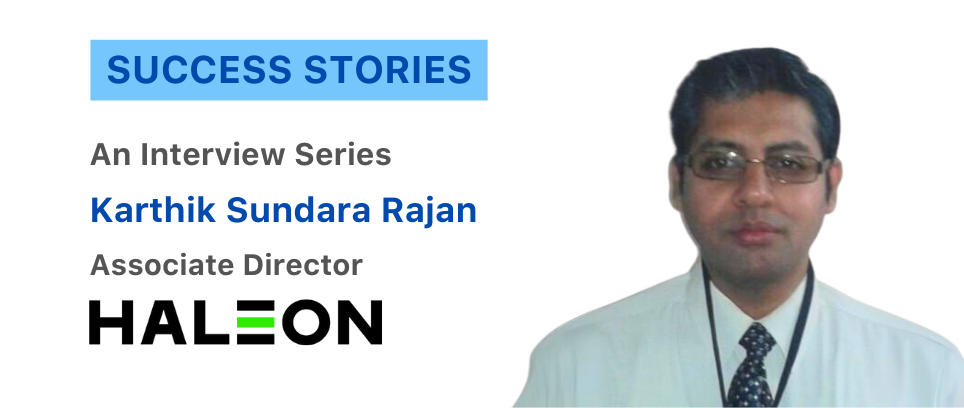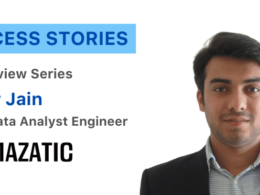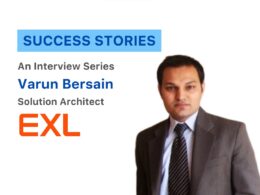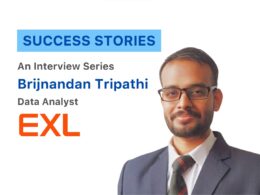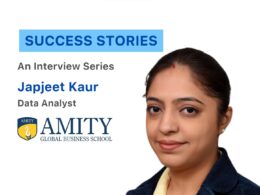Dive into the thrilling success story of Karthik Sundara Rajan, an Associate Director – ERP Service Management & Service Assurance at Haleon! Join him on an exhilarating journey as he unveils how the Global Certificate in Data Science Program by Accredian helped him step in the Data Science industry.
Explore Kathik’s captivating narrative and be inspired by the transformative process that led him to excel in this exciting industry.
Q1: Tell us about your current role and background.
Hello, I’m Karthik Sundara Rajan, presently, I serve as an Associate Director of Service Management Governance and Automation at Novartis, a global pharmaceutical leader. In my role, I oversee process governance, assess evidence from service providers, identify improvement opportunities, and facilitate their implementation by relevant teams, showcasing organizational benefits.
Q2: What challenges did you face while switching to Data Science?
I focus on IT service management processes, ensuring their effective implementation across the organization. My role extends beyond basic governance, requiring me to identify and highlight aspects not readily apparent to the organization.
The challenge lies in uncovering hidden opportunities beyond the obvious, leveraging available data to bring value to the organization.
Q3: How has Data Science helped you in your new role?
Datasets are crucial in leveraging machine learning for service management. With extensive data—up to 200,000 rows for incident perspective and 100,000 rows for service requests—analysis in Excel becomes challenging.
Machine Learning allows me to efficiently analyze and present insights to the organization, a task difficult to achieve using traditional Excel analysis. Through scripting, I can adapt to changing data while revisiting the same information with a fresh perspective, offering incremental and adaptable analyses beyond the constraints of Excel.
Q4: What was the interview like at your current company?
The interview process that I went through, comprises of the following stages:
-
Application Submission:
- The initial stage involves submitting the application, which serves as a zero-round interview.
- The resume and cover letter play a crucial role in showcasing skills and customization to the organization’s needs.
-
Zero-Round Interview:
- The board reviews the application, emphasizing the importance of a well-crafted resume and cover letter.
- Customizing the cover letter to highlight relevant experiences and improvements made in a previous role is key.
-
First Round Interview:
- The interviewee sits in front of the interview panel, emphasizing past experiences and showcasing how these experiences contribute to the organization’s future goals.
- It involves linking past experiences to demonstrate the value the candidate can bring to the organization.
-
Second Round Interview:
- This stage involves discussions with leadership, understanding expectations for the role.
- The candidate clarifies what they have done, what expectations they may not have met, and how they plan to learn and fulfill those expectations over time.
- Emphasizing honesty about learning expectations and skills builds confidence.
-
HR Round:
- The final stage includes salary negotiation and other HR-related discussions.
Efficiently navigating each stage involves showcasing skills, aligning experiences with organizational needs, and demonstrating a willingness to learn and adapt.
Q5: Why Accredian? How did it help you?
Before joining Accredian, I explored other educational avenues, yet Accredian stood out due to its unique approach. Unlike focusing solely on the curriculum, Accredian goes beyond, helping candidates grasp concepts and apply them practically.
The faculty’s involvement extends beyond traditional teaching, offering guidance on real-world implementation. The learning experience, characterized as a 70/30 split between bookish knowledge and practical application, relies heavily on the candidate’s intensity.
Accredian facilitates a shift from being taught to being in a learning pool mode, aiding candidates in exploring challenges and pushing boundaries. This approach significantly contributed to my career growth aspirations.
Q6: What advice would you give to Data Science Beginners?
For freshers and upcoming Data Scientists aiming for growth, remember that learning is an ongoing process. Start by actively absorbing knowledge from your academic courses.
Translate that knowledge into practical skills by participating in hackathons, utilizing platforms like Analytics Vidya and many more for real-world challenges. Evaluate how your skills can contribute to organizations, even if you lack direct experience.
Build a concise yet impactful resume and cover letter, showcasing your applied knowledge and problem-solving abilities. During interviews, emphasize the value you can bring, supported by examples from academic or personal projects.
Establish credibility through a combination of continuous learning, practical skills, and a positive attitude. This advice aims to guide freshers in crafting a solid foundation for their career journey.
We hope you found this success story interesting. If you have any Data Science questions, please fill out this form and we will get back to you.

